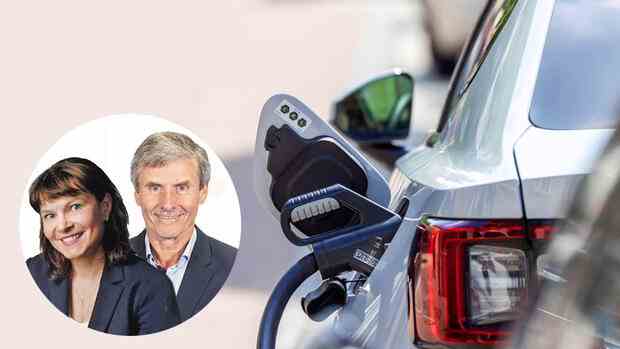At the end of 2020, Japan let the world know that by 2035 the combustion engine would be obsolete in the world’s third largest car market. Norway had previously announced the exit for 2025. England, the Netherlands, Sweden, Denmark, Ireland, Slovenia, Iceland, California and Massachusetts had already banned combustion engines for new cars from 2030.
In France, Spain and Canada, the end of the internal combustion engine has been sealed for 2040. Almost all major car manufacturers announced at the same time that they would be driving “electric only” by 2030. So the EU has also taken up the issue.
Two years after the car manufacturers, the EU cleared the first hurdle for a ban law in June last year. The EU Parliament had voted to ban the sale of new cars with internal combustion engines from 2035.
The decision made the Porsche 911 driver and Finance Minister Christian Lindner and Transport Minister Wissing uneasy. Coincidentally, Porsche had been working on synthetic fuels (e-fuels) made from green electricity for some time.
The energy efficiency of e-fuels is scary, but they could secure the eternal future of the combustion engine. So Minister of Transport Wissing vetoed it in Brussels. The EU had promised that Germany’s concerns would be taken into account.
The second and final step in anchoring the ban on combustion engines requires the approval of the individual EU states. And that would have failed without e-fuels exception.
The dispute overshadowed the EU spring summit. The day after the summit, the Brussels bureaucrats confirmed the Lex E-Fuels meekly, as if to avoid public perception.
Excluding e-fuels from the combustion ban without a dispute would have been meaningless
The child had long since fallen into the well, because the EU Commission has long since made a fool of itself with the dispute. Far worse, however, is that Brussels has opened a kind of Pandora’s box with its amateurish preparation.
The way to the electric car would have been clear, the exception of e-fuels meaningless. A minor compromise would have been agreed.
Due to the high costs of e-fuels, the horrible energy balance, the almost impossible tank infrastructure and the future exhaust gas regulations for combustion engines, he would have made an e-fuels solution at most for a few Porsche 911 or Ferraris.
Basically the same as today’s registration of vintage cars. But with the public dispute, a broad discussion was sparked.
A few days ago, BMW boss Oliver Zipse noted in his balance sheet press conference that it would not make sense to switch off diesel, petrol, hybrid and plug-in hybrids in 2035. This puts you in a raw material dependency for batteries.
“Diversity is resilience,” says Zipse. In addition, one should consider whether it will be possible to provide the complete charging infrastructure for electric cars by 2035.
>>Also read: SMS about e-fuels: What Lindner wrote to Porsche boss Blume
Even more piquant is the way in two opposite directions in the VW group. VW and Porsche boss Oliver Blume calls for e-fuels. His Audi colleague Markus Duesmann, however, contradicts in a slightly cryptic way: “Whoever develops the last combustion engine has to spend a lot of money”. Pandora’s box is open.
EU countries such as Italy, Poland and Bulgaria are against the ban on combustion engines. Italy is now also promoting biofuels, because they can also be produced CO2-free.
And why not have compensatory measures checked from a legal point of view: the planted tree that binds CO2. Industry associations such as the VDA let it be known: “2035 is too early for the ban.” According to a survey by ARD Germany, two-thirds of Germans are against the trend towards the end of new cars with combustion engines.
Sentiment has shifted, and bad sentiment is bad for investing. With its unprofessional approach, the EU Commission has created investment uncertainty. Exactly the opposite of what was planned.
The discussion about e-fuels could be fatal for Germany’s car manufacturers
The e-fuels discussion inspires the topic of whether it is really right to bet so uncompromisingly on the electric car. The argument is, if China and the US don’t have an exit date, why should we define one and put ourselves at a potential competitive disadvantage for our industry?
At the same time, the traffic light coalition is signaling a declining interest in electromobility by reducing environmental premiums for electric cars. All suppliers who deliver parts and components for internal combustion engines sense new opportunities for the old drive.
Shouldn’t suppliers wait and see during the transformation? How open will people be in 2035 to also allow admixtures of e-fuels to “go through” at filling stations?
And anyway – Elon Musk and Tesla. He already has a market-leading position in electric cars with his 1.3 million e-cars sold and writes picture book profits. In the last ten years, it has grown at annual rates of more than 50 percent. If he continues to grow at this rate, he will reach 35 million sales in 2030.
If that were the case, our car manufacturers would be “unsubscribed”. The mood is about to change, and the reason is the clumsy behavior of the EU.
The authors:
Ferdinand Dudenhöffer is the founder and director of the Duisburg CAR – Center Automotive Research.
Beatrix Frisch is Director at the CAR Center Automotive Research.
More: Interview with the Audi boss: “Whoever develops the last combustion engine has to spend a lot of money”
